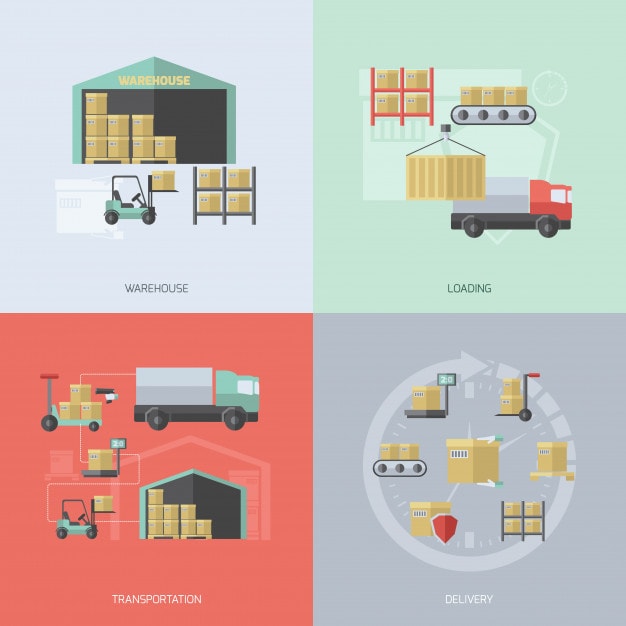
What is a Transportation Management System and Why Your Business Needs it?

The transportation management system (TMS) is a vital tool for supply chain professionals It streamlines processes, tracks freight, and provides technological capabilities that lead to improved services and business growth Without a TMS, companies face challenges in optimizing routing, tracking en-route drivers, and fulfilling orders
The transportation management system, or TMS, is a valuable tool for supply chain professionals that helps manage freight and carriers. This technology is utilized by businesses that regularly ship and receive goods, including logistics service providers, third-party logistics companies, and fourth-party logistics companies.
Ecommerce companies
Distributors
Manufacturers
Retail business
Construction business
Meaning of transportation management system
The transportation management system is a valuable tool for companies that frequently move freight. It streamlines the shipping process by automating tasks and providing valuable insights to minimize future spending and save time. This technology facilitates coordination and planning, optimizes shipments, provides customized solutions, tracks shipping progress, manages the yard, communicates with supply chain stakeholders, and tracks processes to save both money and time.
Outline of the transportation management system
The outline of the transportation management system is as follows-
.
Ensure that the transportation management system vendor has a thorough understanding of the company's current operations before embarking on designing the future system. This will enable them to tailor the system to the specific needs of the company. It is also important to establish standard operating procedures for exceptions to avoid the need for customized coding within the transportation management system. This will ensure a streamlined and efficient process for managing transportation operations.
Go live after fully implemented
Do not short-cut master data clean-up
Do not short-cut testing efforts
Components of the transportation management system
The major components for logistic c companies and shippers who use transportation management system are as follows-
Carrier management
Route and load optimization
Procurement management
Visibility, reporting, and analytics
Freight execution platform
Business intelligence
Invoicing functionality
Freight settlement for audit and pay
Logistics and supply chain data repository
Supply chain communication platform
All the components are incorporated with a transportation management system platform. What the system does for the following stakeholders are listed below
Distribution
The visibility provided to the inbound materials that are required to fill orders
Manufacturing
The clarity provided to the incoming materials that are needed for manufacturing schedule
Procurement/purchasing
Performance reporting and vendor management
Freight
Plan, optimize and execute outbound and inbound product moves
Analyze performance and cost of freight provider partners
Sales
Tracking customer orders
Reporting on performances
Finance
Freight audit
Pay
Invoice
Calculating accruals
Analysing cost performance
Customer service
Address and track customer orders
Vendors
Reposting, managing and scheduling inbound shipment to the customers
Customers
Direct access to shipment and order information
Transportation management system licensing options
The three transportation management system licensing options are
1. On-premises
.
Additionally, this model allows for customization and tailoring of the software to meet specific business needs. However, it does require a significant upfront investment for the license and hardware, as well as ongoing maintenance and support costs.
Another potential challenge with this model is the need for IT expertise to manage the system and ensure it is running smoothly.
Despite these challenges, many businesses still prefer the on-premises model for its control and customization capabilities.
2. Hosted
With the Hosted model, the burden of hosting and managing the transportation management system software is shifted to a third-party provider who delivers services remotely. This software as a service (SaaS) and cloud-based model allows for efficient and cost-effective management of transportation operations without the need for extensive in-house IT infrastructure and expertise.
3. Hybrid
The Hybrid is a blend of Hosted and On-premises licensing. It offers greater flexibility and cost savings.
Advantages of the transportation management system
The advantages of the transportation management system are as follows-
1. Business insights
A transportation management system offers a comprehensive reporting feature that provides valuable insights into the shipping process. All relevant information is centralized, which makes it simple to generate customized reports and analyze discrepancies between final invoices and rates.
2. Simplify processes
The transportation management system streamlines carrier selection by analyzing the goods and identifying the most appropriate carrier from within the network. With all shipping data in one place, past shipments can be easily reviewed and matched with similar ones to find the best carrier fit.
3. Technological capabilities
The transportation management system offers a valuable advantage for shippers by providing them with the necessary technology to make informed routing decisions based on factors such as carrier mix, transit time, and quotes. This centralization of information streamlines the booking process, reducing the time, effort, and stress required.
4. Track freight
A transportation management system is an effective tool for identifying delays in transit and understanding their causes. By tracking freight and receiving alerts for unexpected delays and transit exceptions, businesses can take proactive measures to minimize disruptions and improve their overall logistics operations.
5. Bottom-line results
One of the benefits of the transportation management system is that it ensures shipment booking by incorporating the best service-type and rate.
6. Saves time
The transportation management system streamlines operations by providing shippers with a centralized portal for accessing all necessary information. Through the use of advanced technology, the system not only saves time but also improves efficiency and accuracy in the transportation process.
7. Improved services
The transportation management system ensures seamless supply chain operations, enabling customers to easily trace and track their shipments. With real-time notifications of any changes to the delivery schedule, customers are always kept informed, resulting in improved service quality.
8. Business growth
The implementation of a transportation management system has proven advantageous for companies, as it allows them to effectively meet the needs of both their business operations and customers. As a result, this has led to significant growth and development for these companies.
9. Warehouse efficiencies
The use of a transportation management system minimizes the time taken for freight management. It is now possible to reduce entry errors and inefficiencies in the warehouses.
10. Accounting functionality
The transportation management system serves as a safeguard against errors in auditing and payment processes caused by human factors. With the ability to generate tailored reports and scrutinize any inconsistencies, the system ensures greater accuracy and efficiency in transportation operations.
11. Aligned dock scheduling
Efficient dock scheduling requires a predictable plan and execution to ensure deliveries are aligned and transport is of high quality. This reduces waiting time and ensures smooth transportation from origin to destination.
Disadvantages of a transportation management system
.
Additionally, implementing a transportation management system requires significant time and effort to set up and integrate with existing systems.
Furthermore, there may be a learning curve for employees to understand and effectively use the system, leading to potential productivity losses in the short term.
Lastly, a transportation management system may not be suitable for all types of businesses or transportation operations, as it may not address all specific needs and requirements.
Embedding a transportation management system inside the workflow requires trained staff because a person without training can’t understand and run this system.
Reasons you need a transportation management system
The reasons why a business needs a transportation management system are as follows-
1. Improved cash flow
Implementing an efficient transportation management system can lead to enhanced cash flow and reduced shipping expenses. Furthermore, it enables the evaluation of the financial components of each logistics route, thereby facilitating the identification of cost-saving opportunities in areas such as driver overtime and fuel consumption.
2. Less paperwork
By implementing a transportation management system, businesses can streamline their operations and eliminate the need for manual paperwork. This automated process reduces the risk of invoice errors and incorrect billing, ultimately leading to cost savings and increased efficiency. With lower administration expenses, companies can allocate resources towards other areas of their business, further improving their overall performance.
3. Supply chain visibility
Utilizing a transportation management system is crucial for obtaining a comprehensive understanding of the supply chain system. The capability to access real-time data and have complete operational visibility is a significant accomplishment.
Now the supervisors can resolve issues and act on new opportunities easily
4. Integrated planning and execution
The transportation management system can seamlessly integrate with a business' existing systems, such as Supplier Relationship Management, Customer Relationship Management, Warehouse Management, and Purchasing and Order Management. This integration enables optimized route planning and execution of orders using the most cost-effective carriers.
5. Inventory management
One of the key benefits of implementing a transportation management system in a business is the ease of real-time shipment and order monitoring. With the system, businesses can receive timely updates on the status of every purchase, making it easier to keep track of their operations.
All these facilities result in an accurate idea about the inventory and assist in boosting the accountability of the supply chain network.
6. Order fulfillment
The implementation of a transportation management system provides comprehensive supply chain visibility and enables real-time tracking, leading to improved order fulfillment accuracy. With fewer discrepancies and shipping errors, any arising issues can be promptly addressed.
7. Optimizing routing
The transportation management system has revolutionized the way businesses handle routing challenges. By promoting the adoption of pool distribution, the system offers a faster and more cost-effective delivery process, while also providing greater visibility and control over the entire transportation process.
8. Tracking en-route drivers
By utilizing a transportation management system, it becomes feasible to evaluate the advantages of different routes utilized by drivers, ultimately leading to the creation of a more structured and efficient schedule. Real-time tracking capabilities also provide safety benefits in the event of an accident or mishap, while also allowing users to monitor driver efficiency and offer valuable feedback through the system.
9. Improved customer experience
Meeting the demands of customers for personalized services can be a daunting task for business owners and their teams. A-One services have become a crucial component of any successful entity, as customers expect tailored solutions to meet their unique needs and preferences.
The transportation management system unites all the orders to find the best available carrier at the lowest price> this results in a better and enhanced customer experience
10. Repeat business and referrals
A well-implemented transportation management system has the potential to significantly enhance a company's efficiency and productivity, resulting in substantial cost and time savings. Furthermore, it has the added benefit of fostering customer satisfaction, which can translate into repeat business and referrals, ultimately driving growth for the company.
Challenges faced by companies if you do not have an effective transportation management system in place
.
Furthermore, managing multiple carriers and their rates can be overwhelming, leading to errors and inaccuracies. Keeping track of shipment statuses and ensuring timely deliveries can also be a challenge, especially when dealing with unexpected delays or changes in routes.
Another challenge is finding the most cost-effective and efficient routes for shipments. This requires extensive knowledge of various transportation modes and their corresponding rates, as well as real-time tracking and analysis of traffic conditions and weather patterns.
Overall, transportation management system faces numerous challenges that require innovative solutions and advanced technologies to overcome.
for businesses, especially if they do not have access to a comprehensive transportation management system.
Without a reliable system in place, businesses may struggle to track their shipments and ensure timely delivery. This can lead to delays, missed deadlines, and unhappy customers. By utilizing a transportation management system, businesses can streamline their freight processes and optimize their carrier selection for each shipment. This ultimately leads to improved efficiency, cost savings, and satisfied customers.
It becomes different to gather valuable insights about the cheapest carrier without a proper transportation management system in place











